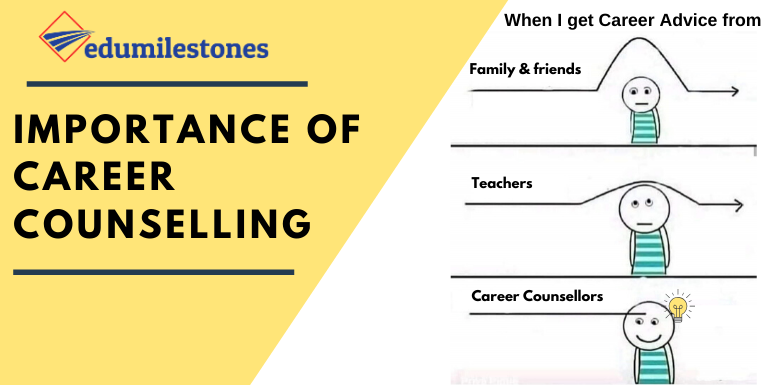It can be noticed that most people seek personal advice related to their careers from related people. Friends or relatives are often the prime sources of information. They are not the villains of your life. However, the equipment of resources forms a paramount concern here. Would you rather trust someone with enough validity or bond? The answer will be the latter option.
The scope of career guidance begins from this pivotal point. Thus, let us look at the complete details in this blog.
Who is a career guide?
As the name suggests, career guides are people who furnish practical advice to people facing occupation obstacles. The guidance often incorporates understanding personality traits, finding the best colleges, discovering a wide array of opportunities, and activating an action plan.
Many people avoid the utility of a career guide and get stuck in a phase. There are a plethora of resources available online which get subjected to interpretation. Thus, analysis and discussion often become daunting tasks. Moreover, one cannot seek personalized advice in the best way possible.
Unspecialized people or resources can come up with obscured or inaccurate information. Do not get perplexed between expert advice and random ones. The common goal of a career guide is to assist an individual about their professional or academic life. After the global pandemic, the necessity of career advice has skyrocketed.
Many job roles have lost their relevance while others have peaked up. It is indeed crucial to know all recent trends and prepare accordingly. Career guides also provide inside information about career exploration or job descriptions.
Aspects of a Career Guide
To gain further information about the career guide, let us look at the crucial elements.
- Skilled counsellor: The first and foremost rule of career guidance is to approach a qualified guide. It is crucial to hold relevant certifications for the professional to uphold their validity. Expertise and skills add brownie points to the whole process. Thus, do not ignore this aspect at any cost.
- Unbiased advice: Are you one of those people who feel bothered by marks judgment? Or, do unsolicited opinions by relatives concern you? Leave all your worries as the career guidance strives to resolve all of them. A career guide provides a secure environment without any biases.
- Awareness about career dilemmas: We as individuals do not render sufficient information regarding circumstances. On the other side, counsellors or career guides have dealt with a large number of people. They regularly devise strategies for a wide range of issues. Thus, their expertise cannot get challenged.
Process of Career Guidance
It is almost impossible to reach a goal without tracing the steps. A similar role gets played by career guides who go through multiple processes to reap the advantages. Here are the most important aspects of it.
1. Introduction
The root task of guidance begins with an initiative first. This stage allows the coaches or mentors to build comfort with clients and know their necessary details. It will permit them to work towards the resolution accordingly. The clients should feel relaxed with the one who is guiding. Even a minor sense of insecurity or hesitation can ruin the result. Major goals include
- Establishment of an efficient relationship between guide and client
- Identification of the existent career planning of an individual
- Sorting down the motivation factors and laying an emphasis
- Finding the current hurdles in the pathway
- Promoting a sense of trust
An introductory communication forms a relevant aspect in career guidance. The counsellors often ask ice-breaking questions to the client. It assists in the identification of their expectations and current scenario. You can also be provided with situations like "What would you do at a particular instance?" The response forms a source of information for guides.
2. Assessment
Now, the first step is often followed by the assessment of those factors. Psychological attributes like interest, personality, and potential get evaluated. The whole life of any person gets based upon who they are from inside out.
For instance, an authoritative person might effectively handle responsibilities as a leader. A shy person would alternatively prefer to work at the backend. It is crucial to note these individual differences and devise methodologies accordingly.
The results are ultimately a product of internal and external factors. A person can receive training to behave under specific circumstances. However, learning is only possible once the assessment is successful. Suppose you are in a classroom with different students. When faced with a math problem, you might approach Divya. Similarly, Chirag would provide better advice in sports.
Everyone has a different skill set and they should know ways to embrace it. Aptitude determines the potential for acquiring skills if a person gets specific resources. An action plan accommodates these factors. Interests and values also give a sense of direction to people. They can choose activities that promote life satisfaction.
The role of assessment is indeed indispensable from career guidance.
3. Exploration
Once done with self-identification, exploration of career pathways forms the next step. Why should an individual limit their career horizons to being a doctor, teacher, or engineer? The options are expanding with time.
Well, knowledge gained through experience is far superior and many times more worthwhile than bookish knowledge. You cannot settle down at your preferred career goal with minimal exposure. A career guide uses both formal and informal assessment to conclude.
The strategies include direct interviewing, job shadowing, and relational networking. For instance, a client with a specific experience can link their skills based on a meaningful experience. Similarly, basic networking begins with the identification of people with a shared passion. They get a sense of knowledge by following these tasks.
The outcomes are often surprising to the clients themselves. It is due to the failure of perceiving things through a different lens or perspective. As a result, new vistas are open for clients seeking intriguing options.
4. Consultation
Here comes the stage when individuals choose the best option from alternative careers. The task is often perplexing to clients as it involves a comprehensive procedure. A list of choices gets executed and further narrowed down.
Formal techniques validate the possible outcomes of the choice. Many people can struggle through the process of uncertainty that further raises the complexity level. Clients need proper guidance to get over that ambiguity.
Career guides resolve it by helping with the decision-making process. They examine closely the perceptions of individuals. It can help with skipping all major barriers in the pathway.
5. Final Execution
Planning is indeed the most nerve-racking and intimidating part of career guidance. The clients are prepared by following specific steps. It includes forming an action plan, arranging resources, and gaining feedback.
An individual is required to follow steps to achieve their defined goals. Not only that but, even the minimal efforts get evaluated continuously. Both sides need to invest a lot of hard work and hope for the best. The preparation stage makes sure that one is no longer stuck at crossroads.
Why should you seek career guidance?
The benefits of a career guide are beyond ones imagination. They can assist individuals by equipping them with decision-making power. As a result, further life decisions are never in vain. Let us look at a few features of it.
- Prevention from making a regretful career decision
- Fixed career pathway and action plan
- The decision of an appropriate profession
- Saving time and monetary costs
- Lifelong empowerment
Do you identify yourself in any of these situations? If your answer is yes, career guidance should be your priority.
Find a career guide near your location on Edumilestones
If you are constantly searching for expert career guidance, Edumilestones is a lifesaver. It is the most reliable counselling ecosystem that strives to solve career-related issues. A wide array of career counsellors are available on the website which exceeds 2,200 in number. An individual can explore the power of one on one counselling through the platform.
Allow me to simplify the steps for you.
- Go to the official website www.edumilestones.com from any device
- Under the option of Find Career Counsellors Near You, select the red button and pick the relevant option from the given options which are: Career Counselling for Students, Career Counselling for Professionals and Career Counselling for Abroad Studies. Next, enter your location in the search box next to the red button.
- You will be directed to a page containing a list of career counsellors and their information. Closely examine these details and select your preferred counsellor.
- Click on Book Appointment or Interested for Call Back Option
- Few details like phone number or mail will be required. Fill them and enjoy your session!
Way Forward
Career guides are best-known to incorporate necessary tools for future planning. The role of these skilled professionals is dynamic. Thus, customization provides scope for amplifying career opportunities. It also empowers people to find what fits the best for them and how to accomplish it.
Do not hold back and let your future be in uncertainty. Deciding earlier is instrumental in providing ample time and resources for career building. After all, it is a lifelong process that involves building strategy, improvement, and evaluation.
We wish you luck in your future endeavours!













